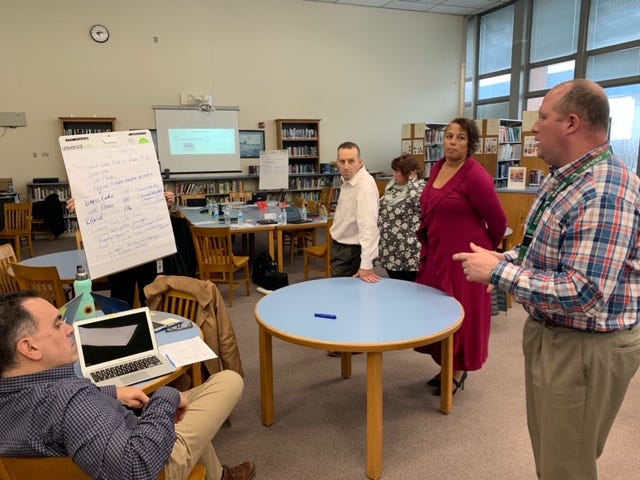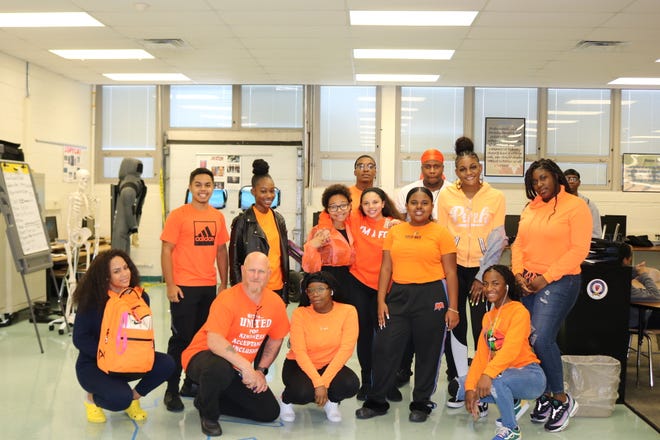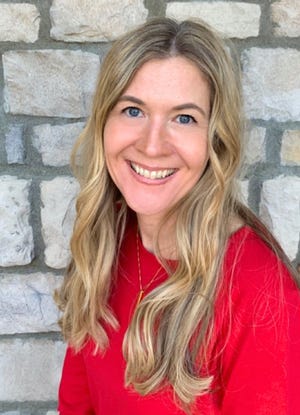BCIT puts diversity and equity at the heart of school culture and curriculum



For the two high school communities at Burlington County Institute of Technology, diversity does not simply refer to race, gender or family income.
Diversity, school officials say, goes deeper than demographics. The principle also takes into account a student’s thoughts, interests, insecurities, learning styles and personal characteristics.
It is a recognition that all individuals are unique and that in education, one size cannot fit all.
As a school community, BCIT seeks to transform its culture and curriculum to accommodate all diversity. If administrators, teachers and students can succeed together, they say, they will create the equity needed to develop unique individuals.
“It’s about building relationships with students,” said Dr. Ashanti Holley, BCIT’s deputy superintendent for equity and diversity. “It’s understanding all that encompasses who they are.”
Holley, who in 18 years as an educator has worked as a special education teacher, guidance counsellor, vice principal and most recently principal at Perth Amboy Secondary School in Middlesex County, came to BCIT in 2019 to lead the “Champions Project”, as she calls it.
After the New Jersey Department of Education announced diversity and equity as statewide priorities, BCIT brought in Holley because he wanted to start emphasizing on diversity and equity in its own policies and procedures.
Holley held “culturally appropriate workshops,” as she called them, at her previous schools. In these workshops, she helped other teachers and counselors learn how to build relationships with students.
“Listen. Listen. Listen,” Holley said of her advice to fellow educators. “Respect what the person says, even if it’s from a different point of view than yours. »
Now, she’s implementing that approach at BCIT’s two-campus high school with more than 2,000 students, according to 2017-18 enrollment data.
The Burlington County School, which combines traditional high school courses, like math and social studies, with more tech-focused electives, in areas like electronics and pre-engineering, has some issues equity she wants to rectify, such as too few minority students in upper-level classes and too few female students in science, technology, engineering, and math classes.
But school officials also want to review their entire culture and curriculum, and begin building the structures necessary to overhaul the culture and curriculum to make them more diverse and equitable.
In 2019-20, Holley established an Equity Action Council comprised of eight BCIT staff members. She also began meeting with other administrators from across the state to discuss ideas for implementing diversity and equity in the classroom.
“It’s like a think tank,” Holley said.
In 2020-21, the Deputy Superintendent is adding 12 more “Equity Champions” to the Council and creating an “Equity Champions” Council of 50 students. Students will be responsible for leading the school’s cultural and spiritual activities, with an emphasis on “how we are more alike than different,” Holley said.
This coming year, the assistant superintendent will also instruct all BCIT teachers to read teacher and equity activist Zaretta Hammond’s book, “Culturally Responsive Teaching and The Brain.” Holley said the book emphasizes “culturally appropriate practices” to “differentiate teaching” and meet students “where they are.”
The BCIT Equity Champion will use the book as a “framework for professional development,” she said, and will host seven professional development days to discuss the text throughout the year.
“We’re looking to build a more responsive and culturally reflective teacher,” Holley said.
Holly wants BCIT students to read “books that reflect our school,” like “Patron Saints of Nothing,” a story about a Filipino-American teenager’s coming-of-age to a struggling immigrant family. . She also wants educators to use yoga, counseling and small-group conflict resolution to help students learn from their mistakes.
Kimberlee Williams, a 25-year-old cosmetology teacher at the school, and second-grade social studies teacher Luke Wiley, voiced their support for the plan.
Both teachers said it was important for students to also understand their own biases and work to dismantle them through a reflective process.
“It’s about seeing the particular student,” Williams said. “It’s 100% about relationships.”
Williams is also thrilled to focus on the accomplishments of minority individuals, rather than their collective will to overcome oppression, which history books often highlight.
“It’s not just about the struggle. It’s about the accomplishments,” she said. “Once we dive into that, it’s like, ‘Hey, I could do that!'”
The school has a socially distanced ABC schedule, with 1/3 of the students coming every day, and with all three groups rotating by coming every third day, in place for the 2020-21 year. And, whenever necessary, board meetings and development sessions can take place on a digital platform, Holley added.
More importantly, Holley is confident that educators will be able to begin to personalize education, build deeper relationships with students, and cultivate unique individuals even during online classroom sessions.
“We’re going to be in session, so I don’t anticipate the pandemic having an effect on us to roll out everything,” she said.
A local journalist and sportscaster in Pennsylvania and New Jersey since 2015, Jarrad Daniel Saffren joined the Burlington County Times’ award-winning local news team in October 2019, adding business, education and municipal government features to the cover. Contact him at [email protected] and follow him on Twitter @JarradSaff. Please help support local journalism by subscribing to the Burlington County Times.






